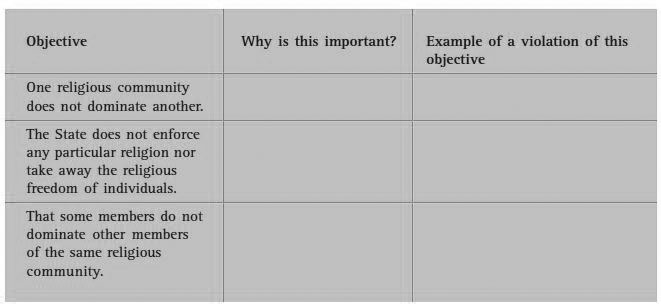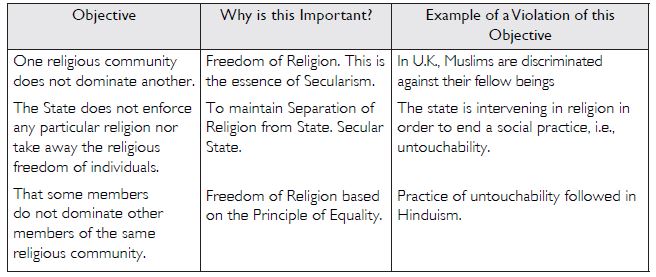Question 1:
Will the government intervene if some religious group says that their religion allows them to practice infanticide? Give reasons for your answer.
Answer:
In India, freedom of religion is given to all citizens. The Government of India as well as state governments do not interfere in the religious matter of any community. But the government has a right to intervene if some religious group says that their religion allows them to practice infanticide. No person or community can be given right to practice infanticide in the name of religion. In India, it is legally banned.
Question 2:
Complete the following table:
Answer:
Question 3:
Look up the annual calendar of holidays of your school. How many of them pertain to different religions? What does this indicate?
Answer:
In my school there are about 15 holidays. Main holidays of different religions are as follows:
Hindu Religion: Deepawali, Dussehra, Maha Shivratri, Janmashtami, Holi, Makar Sakranti, Baisakhi,
Raksha Bandhan.
Islam Religion: Id, Bakra Eid, Muharram.
Sikh Religion: Guru Nanak Devji, Guru Teg Bahadur, Guru Gobind Singh and all Guru’s Birthday.
Christian: Christmas, Good Friday.
Besides the above stated festivals, there are several other religious festivals celebrated in India, the
school holidays of which may vary in different regions.
Different religious holidays indicate that India is a Secular State and all religions are equally respected.
Question 4:
Find out some examples of different views within the same religion.
Answer:
India is a country of vast diversity. People of different religions live together in India. Indian Constitution gives freedom of religion of all persons residing in India. All persons are equally entitled to freedom to conscience and the right to profess, practice and propagate religion. Even within the same religion, people have a right to express their views. For example, in Hinduism some Hindus believe and practice idol worshiping, while there are many Hindus (Arya Samaj) who are against idol worship.
Question 5:
The Indian State both keeps away from religion as well as intervenes in religion. This idea can be quite confusing. Discuss this once again in class using examples from the chapter as well as those that you might have come up with.
Answer:
Indian Constitution has adopted secularism. In its Preamble, India have declared a Secular State. The Indian state both keeps away from religion as well as intervenes in religion. There is no official religion of the state. The state is separate from the religion. Right to freedom of religion has been guaranteed to all persons residing in India. But Article 25 permits the state to regulate economic, financial, political or other secular activities which may be associated with religious practice. The state may also provide for social welfare and reform as the throwing open of Hindu religious institutions of a public character to all classes and sections of Hindus. The Sikhs have been allowed to wear and carry Kirpans. The Constitution has abolished untouchability and its practice in any form is forbidden. Moreover, religious freedom can be enjoyed subject to public order, morality and health.
Question 6:
This poster alongside highlights the need for ‘Peace’. It says, ‘’Peace is a never-ending process....
It cannot ignore our differences or overlook our common interests.’’ Write in your own words
what you think the above sentences are trying to convey? How does it relate to the need for religious tolerance?
Answer:
Peace is very essential for the progress of humanity. War means destruction. In fact, desire for peace is as old as humanity. That is why a peace is a continued process. Peace cannot ignore our differences or overlook our common interests. Religious tolerance is very essential for maintaining social harmony and peace.



